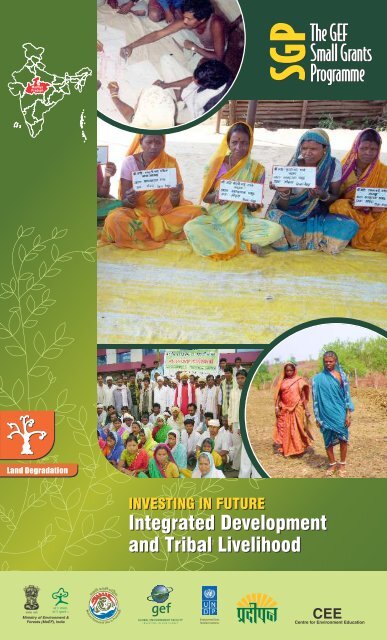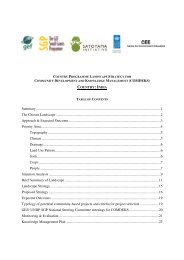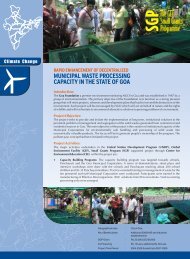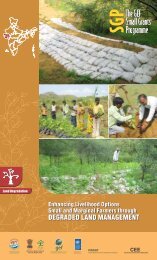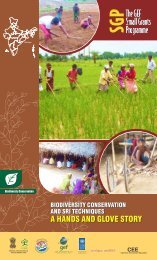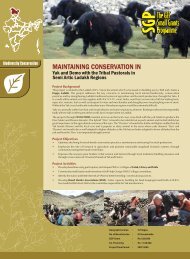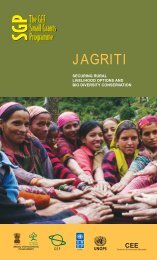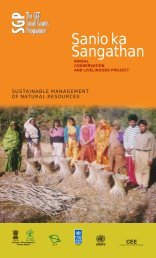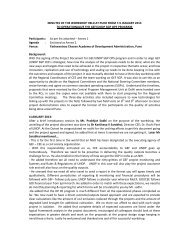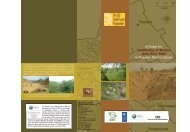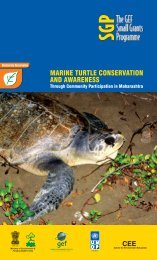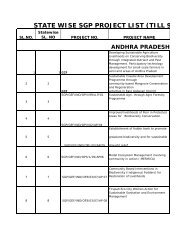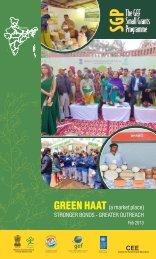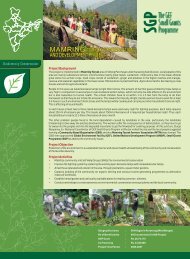Integrated Development and Tribal Livelihood
Pradeepan Folder - SGP India
Pradeepan Folder - SGP India
- No tags were found...
You also want an ePaper? Increase the reach of your titles
YUMPU automatically turns print PDFs into web optimized ePapers that Google loves.
Madhya<br />
Pradesh<br />
L<strong>and</strong> Degradation<br />
INVESTING IN FUTURE<br />
<strong>Integrated</strong> <strong>Development</strong><br />
<strong>and</strong> <strong>Tribal</strong> <strong>Livelihood</strong><br />
Empowered lives.<br />
Resilient nations.
Project Background<br />
Greater concern for addressing the rights of the<br />
marginalized women, creating sustainable<br />
livelihood options for tribals <strong>and</strong> access to<br />
social welfare schemes of the Government,<br />
Pradeepan started working in 1995 in Betul District<br />
of Madhya Pradesh.<br />
Initially to have a greater rapport <strong>and</strong> trust with<br />
locals, the NGOs activities focused more on<br />
spreading awareness among the tribal communities<br />
on education, healthcare, rights, <strong>and</strong> better<br />
governance through panchayats. During this period<br />
Samarthan NGO based in Bhopal (MP) guided<br />
Pradeepan in creating local capacities in<br />
working/empowering panchayats/local governance<br />
issues at village level.<br />
Underst<strong>and</strong>ing the need to create a sustainable future<br />
for tribals, Pradeepan widened the scope of its<br />
activities <strong>and</strong> started the process of linking<br />
panchayats <strong>and</strong> working with the poor, unreached<br />
communities living by the protected forest areas,<br />
with extremely limited resources <strong>and</strong> no options for<br />
better livelihood opportunities.<br />
Pradeepan approached GEF, UNDP Small Grants<br />
Program for linking the actions through Panchayats<br />
<strong>and</strong> Mahatma G<strong>and</strong>hi National Employment Rural<br />
Guarantee Act, (MNERGA).<br />
Pradeepan, jointly with Centre for Environment<br />
Education (CEE) developed a model for sustainable<br />
development, based on the principles of community<br />
participation <strong>and</strong> l<strong>and</strong> degradation issues. It aims to<br />
give the local communities/gram sabhas control over<br />
resources, <strong>and</strong> decisions for better food security.<br />
Name of the Organisation<br />
Pradeepan, Betul, Madhya Pradesh.<br />
Geographical Areas<br />
Forty Villages in Bhimpur Block,<br />
Distt. Betul.<br />
No. of Beneficiaries<br />
2039 Households in 40 Villages. A<br />
Population of 25,000 persons.<br />
SGP Grant ` 19,86,000<br />
Co-financing<br />
` 72,20,400<br />
Project time period<br />
February 2008-December 2012<br />
Project Partners<br />
The project was linked with Mahatma<br />
C<strong>and</strong>hi National Rural Employment<br />
Gurantee Act (MNREGA) in 15<br />
Villages; Indira G<strong>and</strong>hi Awas Yojna;<br />
Block Funds of Rural <strong>Development</strong>;<br />
Gram Sabhas of 40 Villages. Forest<br />
<strong>and</strong> Imigation Dptt. State of Madhya<br />
Pradesh (MP)<br />
Special importance <strong>and</strong> position is given to<br />
women in the program, engaging in addressing<br />
consumption, productive <strong>and</strong> strategic needs of<br />
women. Efforts have been made in building on<br />
the traditional farming methods <strong>and</strong> practices,<br />
local knowledge for sustainable agriculture,<br />
water conservation, storage of grains, fruit<br />
plantations, adoption of non-polluting<br />
cookstoves (chulhas), self employment of<br />
women, small forest produce conservation are<br />
some of the activities undertaken.<br />
The project with GEF SGP was developed with<br />
Gond tribals living in Bhimpur panchyat with<br />
a population of 2039 tribals. With the<br />
livelihoods of these Gond tribals depending<br />
completely on the forests, <strong>and</strong> no means of<br />
transportation to reach Kutanga the nearby road<br />
head, no to limited access to health, education,<br />
employment, credit, information to resources<br />
<strong>and</strong> schemes the idea deserved attention. With<br />
increasing pressure on the forests, increased<br />
dem<strong>and</strong>s for wood <strong>and</strong> fodder, encroachments<br />
on forestl<strong>and</strong> led the NGO Pradeepan to<br />
develop an integrated plan for biodiversity<br />
conservation <strong>and</strong> l<strong>and</strong> development <strong>and</strong><br />
address the issues of tribals.<br />
Project Objectives<br />
Ensure involvement of tribal communities <strong>and</strong><br />
judicious use of resources to address their<br />
livelihood <strong>and</strong> food security issues around the<br />
protected areas.<br />
Project Purpose<br />
Pradeepan, with GEF/UNDP CEE support,<br />
developed an innovative project addressing:<br />
• Empowering Gram Sabhas for better<br />
involvement of women in management<br />
<strong>and</strong> better utilization of natural <strong>and</strong><br />
financial resources.<br />
• Creation of small women kinship,<br />
common trade/area based local<br />
institutions, women led groups for benefit<br />
of tribals in environmental protection <strong>and</strong><br />
protection of local resources <strong>and</strong><br />
advocacy of the same.<br />
• Facilitation <strong>and</strong> enhancing leadership in<br />
women in managing their risks <strong>and</strong><br />
financial capital. Check violence against<br />
women, crime, dowry <strong>and</strong> AIDS.<br />
• Leveraging MNREGA, funds <strong>and</strong><br />
resources link its activities with Forest<br />
Rights Act (FRA); <strong>and</strong> Local State & District<br />
Government Plans.<br />
Project Activities <strong>and</strong> Results<br />
Following a more process <strong>and</strong> a participatory<br />
approach, led the project to document decisions on<br />
village actions at community/SHG levels; minutes<br />
of regular meetings at the village level <strong>and</strong> special<br />
trainings, skill building exercises organized by the<br />
team of NGO. Two/three volunteers were selected<br />
at village levels to facilitate the process of<br />
participation, trainings <strong>and</strong> exposure visits were<br />
organized for farmers, women <strong>and</strong> the community<br />
at large. This process approach laid the foundations<br />
in the program.<br />
• Special attention was paid to the skill<br />
enhancement of forest <strong>and</strong> environmental<br />
committees.<br />
• Campaigns organized especially for protection<br />
of forest <strong>and</strong> sustainable agriculture,<br />
encouragement of local seeds, conservation of<br />
water resources <strong>and</strong> better utilization of the same.<br />
• Skill enhancement of 40 Gram Sabhas was<br />
undertaken. 165 meetings for 1946 men <strong>and</strong><br />
1030 women were held on a range of issues;<br />
water management; rules <strong>and</strong> regulations of<br />
Gram Sabha under the GOI MNERGA. There was<br />
special focus of how women address their<br />
needs/priorities.<br />
• Skill development of women was undertaken<br />
which focused on the h<strong>and</strong>ling of forest produce,<br />
medicinal plants. Fish breeding was taken up<br />
with 200 families <strong>and</strong> in the first year a benefit of<br />
Rs.2000 each was earned by the women. 10<br />
women were able to repay their loans in one<br />
season. This activity has been scaled to benefit 30<br />
households in 2nd year.
Some examples the project addressed in meeting gender needs<br />
Practical Needs Productive Needs Strategic Issues<br />
Reducing time in collection of fuel<br />
wood.<br />
Simple, energy efficient grinding<br />
mills.<br />
Improved health <strong>and</strong> light conditions<br />
because of cookstoves.<br />
Increasing skills, capacities &<br />
opportunities for doing activities in the<br />
evening hours.<br />
Creating skills in managing small<br />
enterprises; funds for investment in<br />
small businesses; <strong>and</strong> ensuring better<br />
savings in expenditure.<br />
Increased diverse enterprises; milk;<br />
diary <strong>and</strong> poultry.<br />
Making life safer for women reduced<br />
drudgery.<br />
Ensuring control over resources <strong>and</strong><br />
fund management their own<br />
households SHGs.<br />
Allowing access to information <strong>and</strong><br />
opening new opportunities for incomes<br />
<strong>and</strong> new given status in society.<br />
• 20 Microplans of 20 villages with focus on MNREGA actions undertaken; this also included a range<br />
of exercises, like village social <strong>and</strong> natural mapping exercises; diagrams-highlighting social <strong>and</strong><br />
power structures in villages; <strong>and</strong> building long term perspectives of locals for better livelihoods.<br />
These exercises strengthened the mutual atmosphere of trust, <strong>and</strong> delivery, the farmers interests<br />
started emerging to address the rights of ownerships in actions.<br />
• Under the MNREGA work for KAPILDHARA well blasting <strong>and</strong> repairs carried out in 101 wells of 553<br />
families across 12 villages at a cost of Rs. 26, 29, 000. Proper community agreements were made in<br />
villages Khamapur, Dori, Dadari <strong>and</strong> Baklikhera.<br />
• <strong>Development</strong> of village ponds (2) small concrete check dams (4), permanent road repairs (nearly 5<br />
kms), small culverts (3) undertaken in Chunabhura, Mak<strong>and</strong>a <strong>and</strong> D<strong>and</strong>ari at a cost of Rs.11,29,000<br />
as co financing through Panchyat funds. This process enhanced the community trust with the NGO.<br />
• Small actions like linking the creation of job cards under Mahatma G<strong>and</strong>hi National Employment<br />
Rural Gurantee Act. (MNERGA) undertaken for the first time in the region <strong>and</strong> impacted for assured<br />
livelihoods of 164 families. This facilitated Panchayats to clear the pending dues under NREGA for<br />
Rs.4.5 lacs as labour payment. The NGO all along guided <strong>and</strong> supported by SAMARTHAN, the local<br />
resource agency working for better governance <strong>and</strong> GEF/UNDP SGP for field based livelihood<br />
activities.<br />
• Due to emerging relationships with the forest department <strong>and</strong> proper systems followed in support of<br />
the work undertaken by mostly illiterate tribal Gond communities. The labour charges for 35 laborers<br />
for 6 months were paid (Rs.1,47,000 was disbursed from the Forest Department). Forest department<br />
also paid to villagers in Gadakher village Rs. 125,000/-<br />
• Direct benefit of Rs 5, 95, 000 was created<br />
through SHG loans for 17 poor homeless<br />
families. This was created to develop small shops<br />
<strong>and</strong> local enterprise <strong>and</strong> artisans as repair shops<br />
for the bullock carts; cycle repairs <strong>and</strong> tailoring<br />
units. 44 senior citizens <strong>and</strong> economically weak<br />
people integrated under social security pension<br />
of Rs. 200 per month is paid to them.<br />
• Integration of 23 farmers with agriculture<br />
department under NADEP. 20 villagers covered<br />
under the CM's Awas Yojna. More emphasis has<br />
been on developing business enterprise on<br />
introducing cash crops of chilies <strong>and</strong> papayas.<br />
More than 57 farmers earned in three crops<br />
nearly Rs 25,000-35000 as profits in 6/7 months.<br />
Project Impacts<br />
Through this project under the MNREGA; work was undertaken<br />
for sustainable livelihoods <strong>and</strong> food security. Pradeepan has been<br />
seen by a range of stakeholders as a mutually support institution<br />
leading to leverage resources <strong>and</strong> ensure delivery.<br />
• Private l<strong>and</strong> improvement of nearly 70 hacters, leading to more<br />
than 20-70% increase in productivity <strong>and</strong> also nearly 50 % shift<br />
from low income to high income crops e.g. wheat, chick pea<br />
from minor millets etc.<br />
• An outlay of Rs. 2,09,000 provided to 95 families for<br />
development of toilets under the rural sanitation program of the<br />
State of Madhya Pradesh & UNICEF.<br />
• 20 Gram Sabhas made focused work plans towards livelihoods<br />
<strong>and</strong> sustainable development. This planning integrated into the<br />
gram sabhas planning. A new approach led to long term<br />
resilience of tribal communities – in one voice. Nearly 112<br />
women SHGs formed with 520 women members, enabling a<br />
saving of Rs 3.2 lacs <strong>and</strong> also accessing nearly Rs 10 lacs as<br />
grants/loan.<br />
• Women started participating in Gram Sabhas. They have<br />
especially started raising issues of development, livelihoods,<br />
water sanitation <strong>and</strong> hygiene. Women are seen as internal<br />
champions <strong>and</strong> leaders of tomorrow. In Pradeepan<br />
communities <strong>and</strong> project staff have acquired new skills<br />
particularly in social <strong>and</strong> institutional analysis <strong>and</strong> an ability to<br />
seal ideas <strong>and</strong> manage change.<br />
Recognition Rekha Gujre<br />
Rekha Gujre was selected for an award in January 2012 by the<br />
Earth Day Network for her contributions to the environment <strong>and</strong><br />
women empowerment she was also felicitated by UNDP Country<br />
Office, India for the exemplary work she has undertaken in the<br />
remote tribal areas with women, creating local enterprise <strong>and</strong><br />
increased rural incomes.<br />
Lesson<br />
In increasing the effectiveness of sustainable livelihood approaches <strong>and</strong> environment protection, we<br />
certainly to build rapport <strong>and</strong> trust before major investments in villages. Also we need to pay adequate<br />
attention to link communities t markets. Actively engage with people to underst<strong>and</strong> the complex issues of<br />
livelihoods analyse the internal (village level, communities dynamics) factors <strong>and</strong> external (stakeholder)<br />
factors affecting ad influencing the sustainable livelihoods. These analysis helps <strong>and</strong> provides important<br />
insights into "why people remain poor" <strong>and</strong> what meanies need to be adopted to mitigate poverty.<br />
Rekha Gujre <strong>and</strong> Manoj Gujre<br />
Director <strong>and</strong> Sr. Project Manager<br />
Gram Post Borgaon (Jin), Distt. Betul (M.P.) 460001<br />
Ph.: 91-07141-231969, 264663<br />
Mob.: 09406936755, 09425132968<br />
+91 898574184<br />
Email: pradeepan_05@yahoo.com<br />
Regional Co-ordinator<br />
Flat No 10, Garden Estate,<br />
167/1,168/1, New DP Road,<br />
City International School,<br />
Aundh, Pune<br />
Tel: 020-5887009<br />
Email: ceecentral@ceeindia.org<br />
Colours 9810037571/SGP/April/13<br />
Text: Mr. Prabhjot Sodhi, Manoj Gujre <strong>and</strong> Anil Arora<br />
Country Program Manager<br />
GEF UNDP Small Grants Programme<br />
Centre for Environment Education<br />
C-40 South Extension-II, New Delhi-110049,<br />
Ph.: 011-26262878-80<br />
Email: prabhjot.sodhi@ceeindia.org<br />
Website: www.sgpindia.org,www.ceeindia.org


